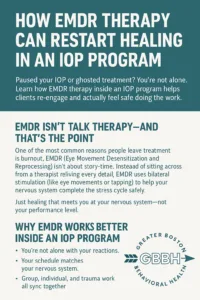Maybe you just stopped going one day. Maybe you planned to return but never did. Ghosting your IOP program might not have been the plan, but now you’re stuck with that feeling—like you blew it, and the door is probably closed.
Here’s what most people don’t realize: stepping away doesn’t make you unfit for treatment. It makes you human. Especially if trauma was part of why you left in the first place. And for a lot of clients, the piece that changes everything is EMDR therapy—especially when it’s offered within an IOP program.
At Greater Boston Behavioral Health, we see this every week: people coming back after walking away, finding a new way forward with EMDR. If you’re looking for IOP program, EMDR Therapy in Newton or Needham, you’re not starting from scratch. You’re starting smarter.
EMDR Isn’t Talk Therapy—and That’s the Point
One of the most common reasons people leave treatment is burnout. Not just from showing up—but from having to explain over and over. Why you feel the way you do. What happened when you were younger. The story behind every panic attack, flashback, or missed session.
EMDR (Eye Movement Desensitization and Reprocessing) isn’t about story-time. It helps your brain process memories the way it was supposed to… before life got too loud or too dangerous. Instead of sitting across from a therapist reliving every detail, EMDR uses bilateral stimulation (like eye movements or tapping) to help your nervous system complete the stress cycle safely.
No dramatic breakthrough monologues. No “having to get into it” unless you want to. Just healing that meets you at your nervous system—not your performance level.
Why EMDR Works Better Inside an IOP Program
You can technically do EMDR in weekly outpatient therapy. But when it’s embedded in an IOP program, it lands differently. Here’s why:
- You’re not alone with your reactions.
Trauma work opens things up. In IOP, you’re supported the same day, not left hanging till next week. - Your schedule matches your nervous system.
EMDR can leave you tired, stirred up, or even calm in ways you’re not used to. IOP provides rhythm and accountability to hold that newness. - Group, individual, and trauma work all sync together.
You get daily structure, peer support, and a clinical container that adapts as you shift—not a one-size-fits-all template.
Our Boston-area IOP program with EMDR therapy creates that holding space. And if you left because therapy felt overwhelming, unsafe, or just too much? That’s often exactly what EMDR helps change.
Trauma Isn’t an Excuse—It’s a Clue
What if the thing that made you ghost treatment… was the reason you needed treatment?
Let’s be honest. Trauma doesn’t show up as a sob story. It shows up as:
- Going numb in group when others share
- Feeling like therapy is too fast, too slow, or too intimate
- Thinking your reactions don’t make sense (but not knowing how to stop them)
- Quitting before something “bad” happens—because your brain’s trying to protect you
When trauma drives the bus, dropping out is often a survival strategy. EMDR doesn’t scold that part of you. It works with it, so you can heal instead of hustle through.
You Can Come Back. No Groveling Required.
There’s this quiet shame narrative that sneaks in: They probably think I wasn’t serious. They won’t want me back.
Let’s end that myth.
At Greater Boston Behavioral Health, we’ve seen dozens of clients re-enter after disappearing. Sometimes it’s a month later. Sometimes it’s two years. The door isn’t locked.
Whether you’re in Dedham, Newton, or right here in Boston, if you’re thinking about returning to IOP and wondering if EMDR could help, we’re here. No big dramatic explanation needed. Just a call or message. We already know: if you’re reaching out, something in you wants to heal.
EMDR Works Even If You’re Not Sure It Will
Skeptical? So are most people.
You might’ve read about it and thought, Wait…eye movements?
Or maybe your old therapist mentioned it and you tuned out.
But here’s what actually matters: EMDR isn’t a belief system. It’s a process that helps your brain shift without dragging you through the trauma swamp again. You stay in control. You stay grounded. You don’t have to explain it perfectly for it to work.
And inside a trauma-informed IOP program? You don’t even have to believe in it. You just have to show up once.
You Didn’t “Waste” Your Last Round of Treatment
Let’s reframe this.
Leaving your last program wasn’t wasted time. It was information. It taught you what didn’t work, what pushed you out, what felt safe or unsafe.
That data matters.
Coming back with a trauma lens—especially one that includes EMDR—changes how you experience group, your therapist, and yourself. You’re not starting over. You’re starting smarter.
Quick Tips: If You’re Thinking About Coming Back
Not sure how to take the first step? Try this:
- Call and ask about EMDR availability inside IOP. You don’t need to commit.
- Mention that you’ve been in treatment before—it’s not a bad thing.
- Let someone know if the idea of rejoining makes you anxious.
- Ask about group structure and how trauma work is supported.
- Give yourself permission to test the waters.
FAQ: EMDR and IOP for Returning Clients
What if I’ve ghosted before—will you still take me seriously?
Yes. We expect that people will leave sometimes. It doesn’t mean you failed. It means you’re human. We don’t hold that against you—we just want to help you find what works.
Do I have to start at the beginning if I re-enter the program?
Not necessarily. We’ll meet you where you are, review what worked last time, and build from there. If EMDR feels like the right fit, we can integrate it early.
Is EMDR right for everyone in IOP?
No therapy is one-size-fits-all. But if you’ve left treatment due to emotional overwhelm, trauma history, or burnout, EMDR might help shift that pattern. We’ll assess together what fits best.
What if I’m not ready to talk about my trauma?
You don’t have to. EMDR works without full verbal disclosure. Your brain does the work internally. You only share what you choose to, when you’re ready.
Can I do EMDR if I’m still feeling unstable or anxious?
Yes—but it has to be the right moment and setting. That’s why we use stabilization techniques and daily support within IOP to make EMDR safe, not scary.
Ready to Return—Without Explaining Everything?
You don’t need to start over. You just need to start again—with support that meets you where you are. Call (888) 450-3097 or visit our IOP program with EMDR Therapy in Boston, Massachusetts to talk through your options. We’re here when you’re ready.


